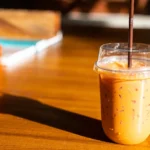Caffeine is a naturally occurring stimulant found in plants like tea, coffee, and cocoa. For some people, it can provide a boost of energy to get through the day while others may avoid drinking caffeinated beverages due to its potential side effects. Chai tea is one of the most popular varieties of teas that contains caffeine – but exactly how much caffeine is in a chai tea? In this post we’ll answer questions about caffeine in chai tea so you can make an informed choice when selecting your next cup!
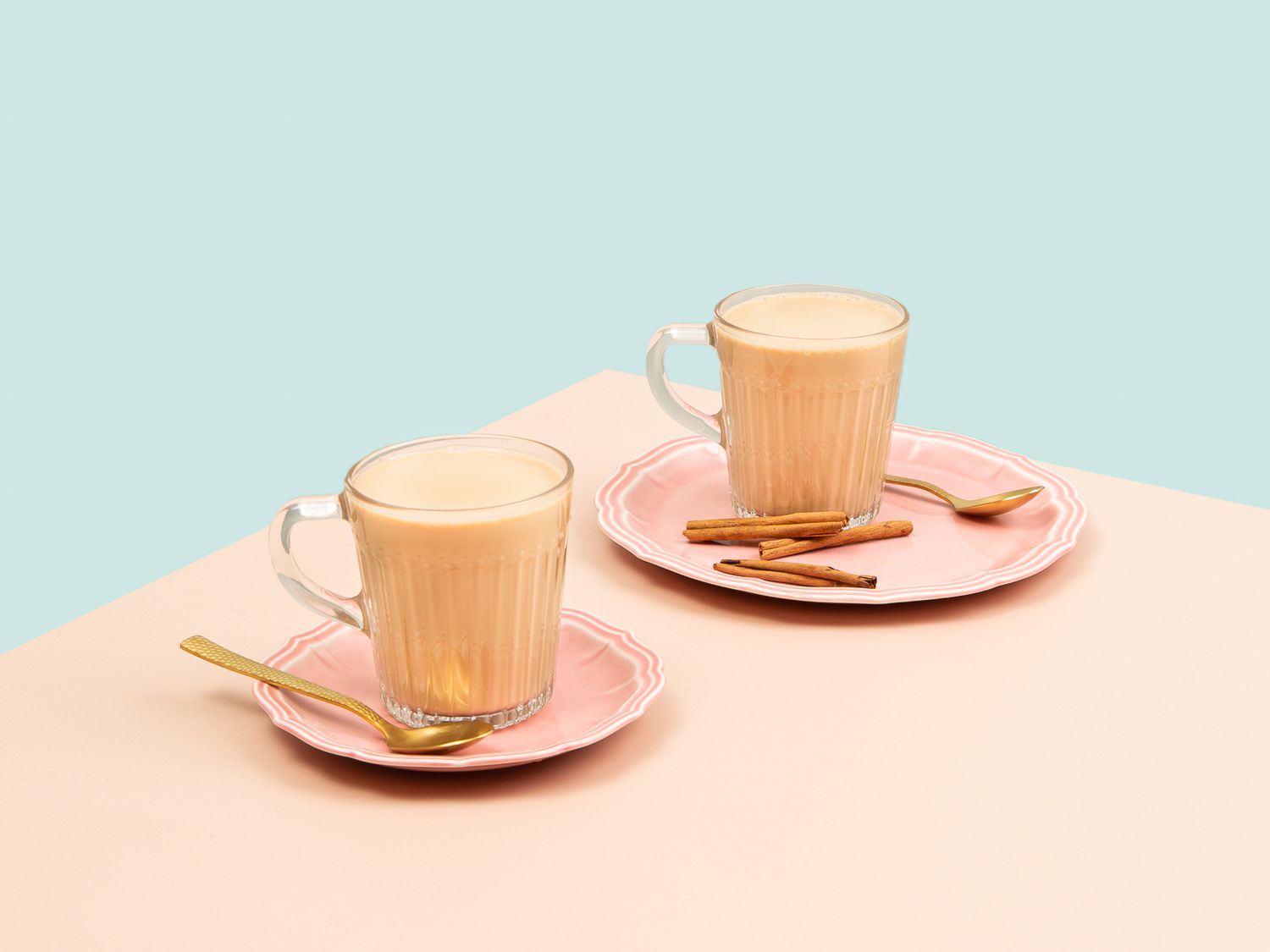
Contents
What Is Chai Tea?
Chai tea is a popular beverage that combines several spices with black tea. It originated in India and is frequently consumed in the United States for its unique flavor profile. The traditional chai blend includes cardamom, cinnamon, ginger, cloves, and other spices combined with black tea leaves. Other variations exist as well, including herbal infusions or green teas.
The Origins Of Chai Tea
The origins of chai tea trace back to India, where the drink is believed to have been created centuries ago. The traditional recipe calls for black tea leaves and a blend of spices, including cardamom, cinnamon, ginger, cloves and sometimes black pepper or nutmeg. This blend of spices creates a unique flavor profile that has become popular around the world.
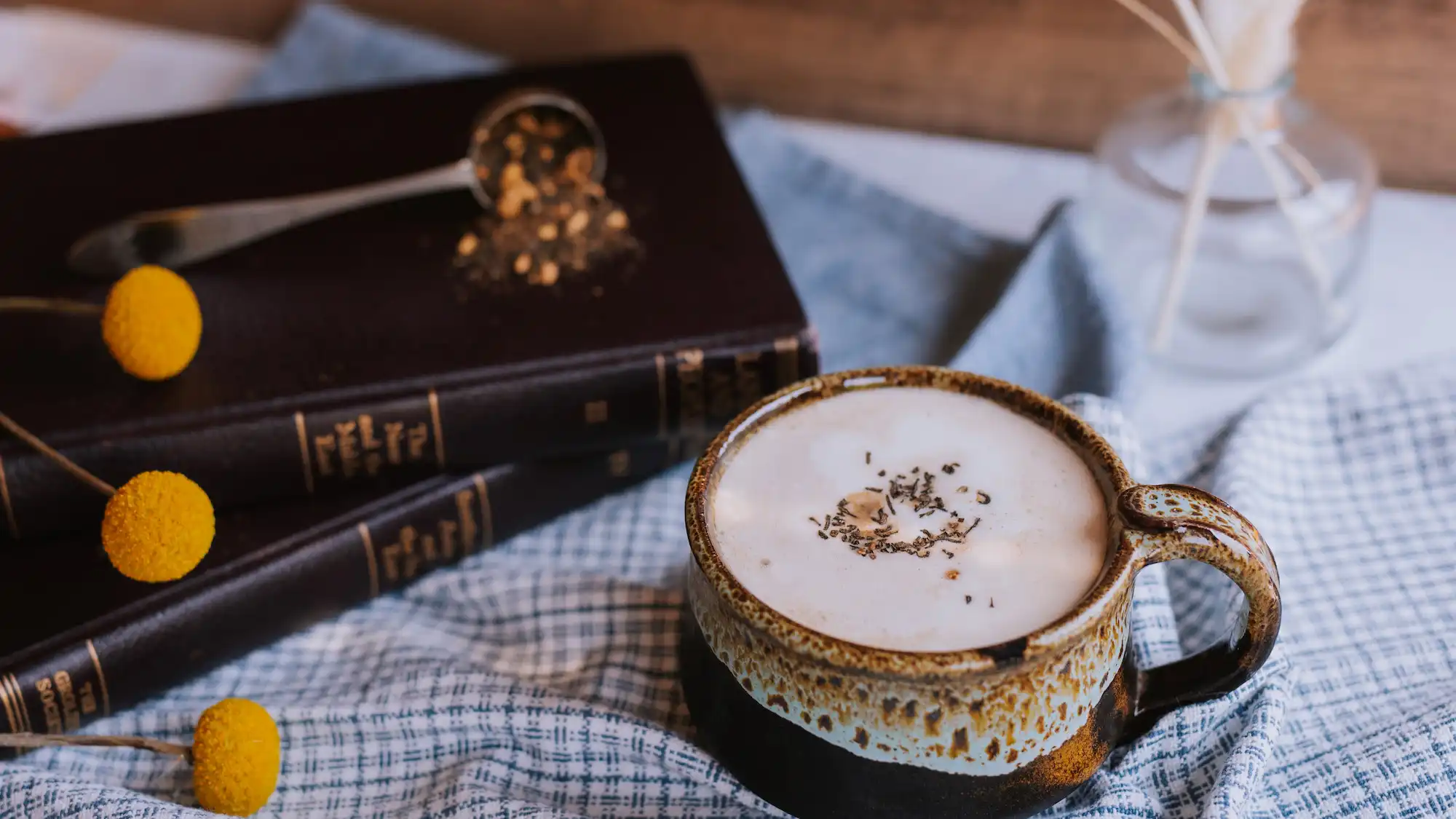
Ingredients In Chai Tea
The traditional ingredients used in a chai tea blend are black tea leaves and a combination of spices. Common spices included are cardamom, cinnamon, ginger, cloves, and sometimes nutmeg or black pepper. There may also be variations based on region or personal preference. Other ingredients can be added to change the flavor or texture of the beverage, such as milk, honey, or sugar.
Does Chai Tea Have Caffeine?
Yes, chai tea contains caffeine. The amount of caffeine in a chai tea will depend on the type and quantity of tea leaves used in the blend. Black teas, which are commonly used, contain more caffeine than green teas or herbal infusions. On average, a cup of chai tea contains around 40-50mg of caffeine, but this can vary depending on the recipe and brewing method.
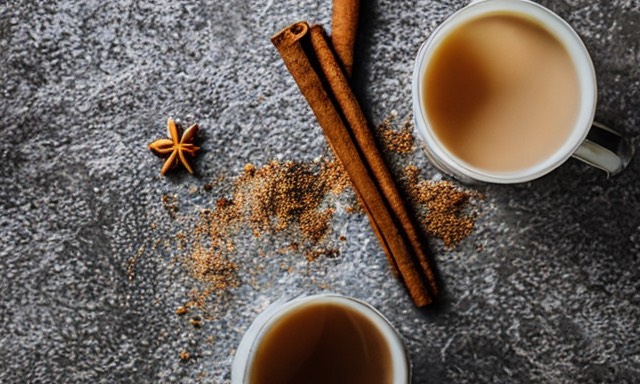
How Much Caffeine Is In A Chai Tea?
The amount of caffeine in a chai tea can vary depending on the type and quantity of tea leaves used, as well as how the beverage is prepared. On average, an 8-ounce cup of chai tea contains about 40-50mg of caffeine. This is slightly higher than the amount found in a standard cup of coffee, which typically contains around 95mg of caffeine. However, it is important to note that the amount of caffeine can also vary depending on your brewing method and recipe ingredients. When in doubt, it’s best to consult a nutritionist or health professional for advice.
Let’s watch this video to know more about how much caffeine is in a chai tea.
Factors That Affect The Caffeine Content In Chai Tea
The amount of caffeine in a chai tea can be affected by several factors, such as the type and quantity of tea leaves used in the blend, the brewing time, and any additional ingredients added. For example, using green tea leaves or herbal infusions will result in lower caffeine levels than black teas. Longer brewing times will also increase the caffeine content. Adding milk, honey, or sugar to the beverage will not affect its caffeine levels. Chai tea can be a great way to enjoy the unique flavor profile associated with this popular beverage without having to consume high levels of caffeine. By understanding what factors can influence the caffeine content in chai tea, you can better control how much caffeine you take in and enjoy your drink responsibly.
Benefits To Know How Much Caffeine Is In A Chai Tea
Knowing how much caffeine is in a chai tea can help you make an informed choice when selecting your next cup. If you’re looking for an energy boost, opt for a traditional masala chai brewed with whole spices and black tea leaves. For those seeking a milder option, consider reducing the amount of ingredients used or opting for herbal chais such as rooibos or honeybush. Ultimately, understanding the caffeine content of chai tea can help you decide which type is best for your needs and preferences.
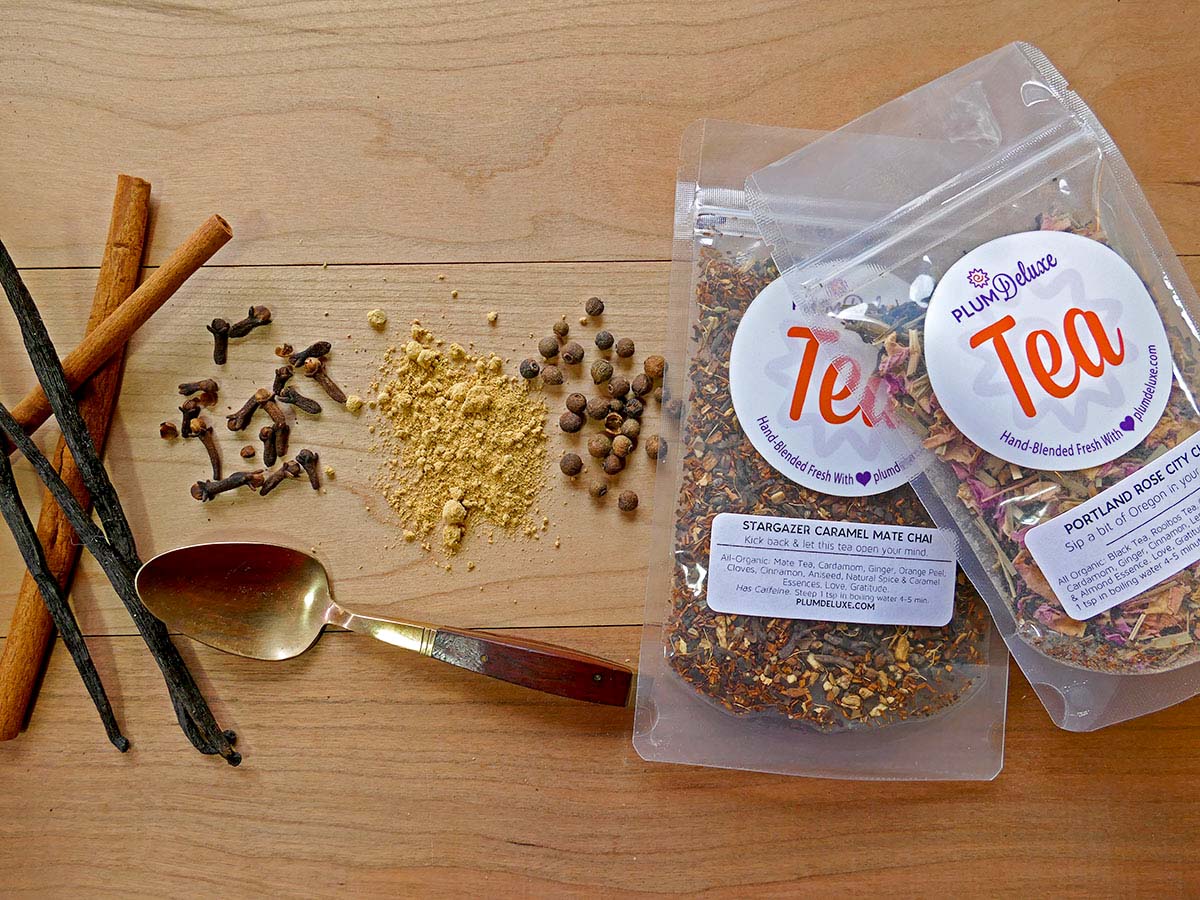
How To Determine The Caffeine Content In Chai Tea?
Now that you know more about how much caffeine is in a chai tea, let’s explore next question. When buying pre-packaged chai tea, it’s important to check the label for information about caffeine content. This can be found in the nutritional facts section of most packages. If you’re making your own chai tea at home, use a digital scale to measure out the exact amount of tea leaves used and consider timing how long they steep. This will help you determine the approximate caffeine content of your chai tea blend. Additionally, adding or removing certain ingredients can also alter the caffeine content of your drink. For example, using green tea leaves instead of black tea leaves will reduce the amount of caffeine present in your chai tea.
Different Types Of Chai Tea And Their Caffeine Content
The amount of caffeine in chai tea can vary depending on the type of tea used. Black teas are typically higher in caffeine content than green teas or herbal infusions. Additionally, some special blends such as decaffeinated chai tea contain very low levels of caffeine. Some popular varieties of chai tea and their approximate caffeine content include:
- Classic Chai Tea: 40-50mg of caffeine
- Decaffeinated Chai Tea: Less than 1 mg of caffeine
- Green Tea Chai: 10-20mg of caffeine
- Herbal Chai Tea: Caffeine free
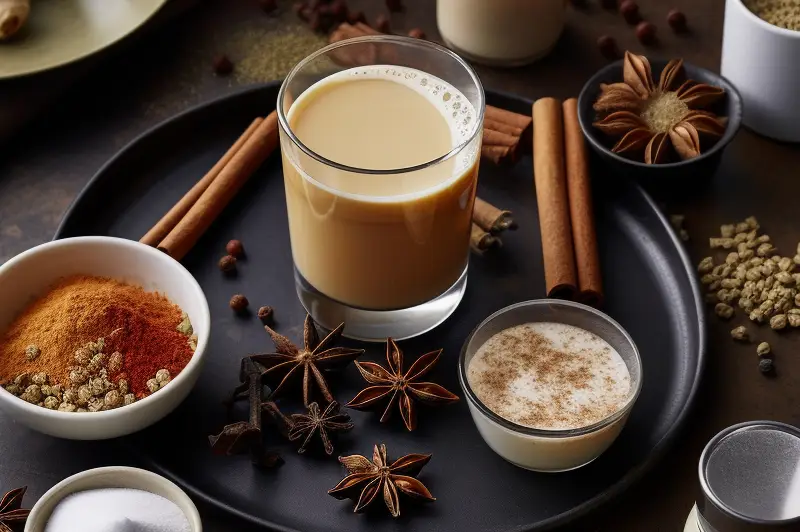
Health Benefits Of Drinking Chai Tea
In addition to its unique flavor, chai tea also has several potential health benefits. Studies have shown that drinking chai tea could help reduce inflammation and fight off infection due to the powerful antioxidant properties of its spices. Additionally, it may also improve digestion, aid in weight loss, and even reduce stress levels. As with any food or beverage, be sure to check with your healthcare provider before adding chai tea to your diet.
By understanding the origins and composition of chai tea, as well as its potential caffeine content, you can make an informed decision about how much of this popular beverage to consume. With so many varieties available, there are plenty of ways to enjoy a cup of chai tea without having to worry about high caffeine levels. Whether you’re looking for something to enjoy on a special occasion, or just want to relax with a delicious cup of chai tea, there are plenty of options to choose from. Enjoy!
Tips For Enjoying Chai Tea Responsibly
- Buy pre-packaged chai tea and check the label for information about caffeine content.
- If making your own chai tea, use a digital scale to measure out the exact amount of tea leaves used and consider timing how long they steep.
- Use green tea leaves, herbal infusions, or decaffeinated teas when trying to reduce the caffeine content in your chai tea blend.
- Add milk, honey, or sugar to the beverage if you prefer a richer flavor without increasing caffeine levels.
- Drink chai tea responsibly and in moderation, as it still contains some level of caffeine.
- Speak with your healthcare provider before adding chai tea to your diet.
- Enjoy a cup of chai tea and savor its unique flavor profile!
Chai tea is a delicious and aromatic beverage that can be enjoyed in many different ways. From its origins to the potential health benefits it offers, there’s a lot to explore when it comes to this beloved drink. With the right knowledge and understanding of caffeine content, you can make an informed decision about how much chai tea to consume and enjoy it responsibly. So go ahead and savor a delicious cup of chai tea today!
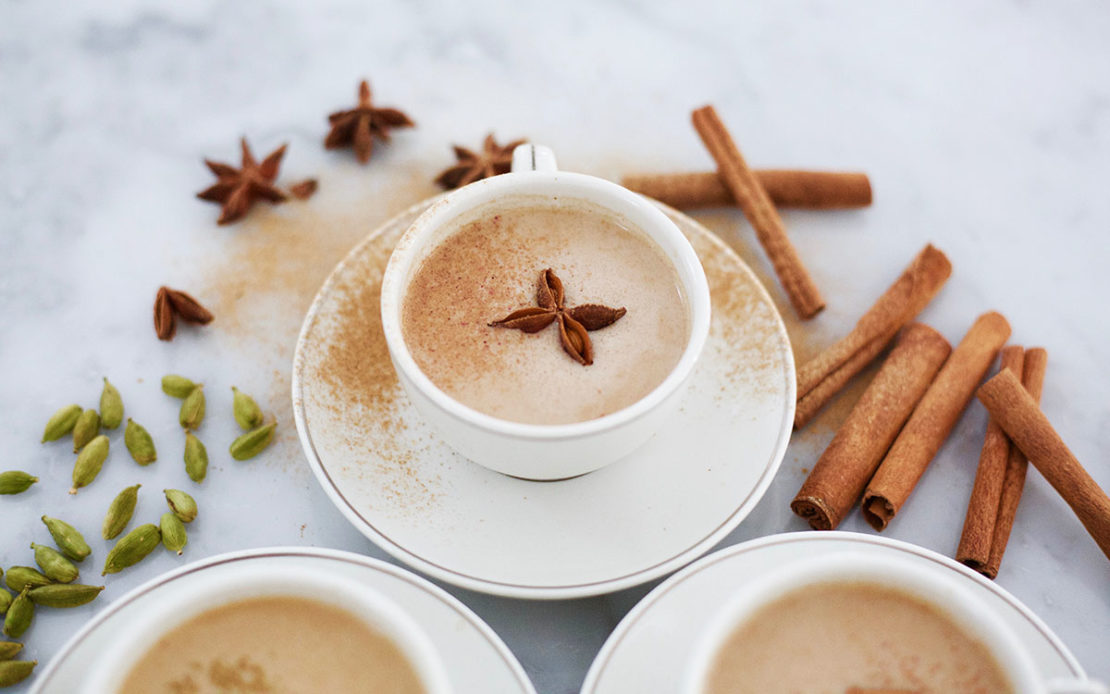
Conclusion: How Much Caffeine Is In A Chai Tea?
In conclusion, the amount of caffeine in chai tea can vary widely depending on the type and brewing method used. Traditional masala chais brewed with whole spices and black tea leaves can contain anywhere from 30-90 mg of caffeine per 8 ounce cup – while herbal versions such as rooibos or honeybush are generally caffeine-free. Ultimately, understanding how much caffeine is in a chai tea can help you make an informed choice when selecting your next cup. By experimenting with different types and ratios of spices, you can create your own unique chai tea recipe that provides the perfect balance of flavor and energy! Thank you for reading at yongkangstreetnyc.com.
FAQs: Chai Tea
Can chai tea be caffeine free?
Chai tea typically consists of warm milk, spices, sweetener, and black tea. However, it’s important to note that unless you specifically request a decaffeinated chai, the black tea used will contain caffeine. The exact amount of caffeine in a single cup can vary depending on multiple factors.
Does chai have caffeine vs green tea?
When considering chai and green tea, one key aspect to consider is their caffeine levels. In approximately the same quantity, chai contains about 75 mg of caffeine, whereas green tea contains about 50 mg.
Which chai tea has no caffeine?
This delicious blend combines mellow rooibos with aromatic spices like cinnamon, ginger, cloves, and cardamom, creating a sweet and satisfying after-dinner indulgence.
What is the caffeine difference between chai tea and coffee?
Chai tea typically contains 50-120 mg of caffeine, while the average cup of coffee contains 30-95 mg. The variation in caffeine levels is influenced by factors such as preparation and steeping time for chai tea.
Does chai tea have caffeine or nicotine?
Through liquid chromatography-tandem mass spectrometry, it has been discovered that tea plants (Camellia sinensis L.) do contain endogenous nicotine. This finding was confirmed by analyzing tea samples from various tea-producing regions in six Asian countries. Interestingly, all of the samples examined contained nicotine, with levels ranging from 0.011 to 0.694 μg g−1 dry weight.
Does chai or Matcha have more caffeine?
Matcha latte boasts a caffeine content of 50 to 130 mg per serving, with the quality of the matcha being a determining factor. On the other hand, chai latte offers a range of 35 to 55 mg of caffeine per serving, depending on whether it is made with powder or concentrate.
How much caffeine is in chai tea latte?
Contrary to popular belief, a chai latte does not surpass the caffeine levels found in coffee. Typically, an 8 oz (237 ml) serving of chai latte contains 25 – 60 mg of caffeine, whereas an equivalent cup of coffee contains roughly 80 – 100 mg. Alternatively, an 8 oz (237 ml) latte with one shot of espresso will contain approximately 64 mg of caffeine. Unveil the caffeine facts behind your favorite chai tea latte.
How caffeinated is a dirty chai?
With approximately 160 milligrams of caffeine per 12-ounce serving, this beverage gets its kick from a blend of black tea and a shot of espresso. Coffee enthusiasts can even ramp up the coffee intensity in their iced dirty chai.
Does chai tea have less caffeine than espresso?
When comparing caffeine levels, it’s important to note that different types of beverages vary in their caffeine content. Chai lattes, which are made with black tea as their base, typically have around 30 to 50 milligrams of caffeine per 8-ounce cup. In contrast, a single shot of espresso contains approximately 64 milligrams of caffeine.
How much chai tea should you drink a day?
At The Chai Room, we believe that two to three cups of tea a day can enhance your overall health and wellness. Join us in prioritizing your well-being by making the ritual of tea a regular part of your day.
Is it OK to drink chai every day?
Embrace the daily ritual of savoring a delightful cup of masala chai. Not only will you relish in the comforting flavors, but you’ll also indulge in the countless health benefits this invigorating beverage possesses. Safely and effortlessly start your day with masala chai, a refreshing potion that may even reduce the risk of serious illnesses like cancer. Delight in the goodness of masala chai, without a worry about any adverse effects.
Why do I feel sleepy after drinking chai?
Recent research by Worley reveals that both tea and coffee act as diuretics, causing frequent urination which leads to dehydration. But that’s not all. The caffeine withdrawal and adenosine buildup that comes with drinking chai can also contribute to serious fatigue. Discover the fascinating science behind your afternoon drowsiness.

Chef Yong Kang has over 20 years of experience cooking in the finest restaurants, and is excited to present their vision to you and all our guests. Our caring and committed staff will ensure you have a fantastic experience with us.
We are also available for private events:, business lunches, dinners, and more. We would love to discuss how to be a part of your next event.Our restaurant refuses to compromise on quality, which is why we source our fresh ingredients from local farmers’ markets.





